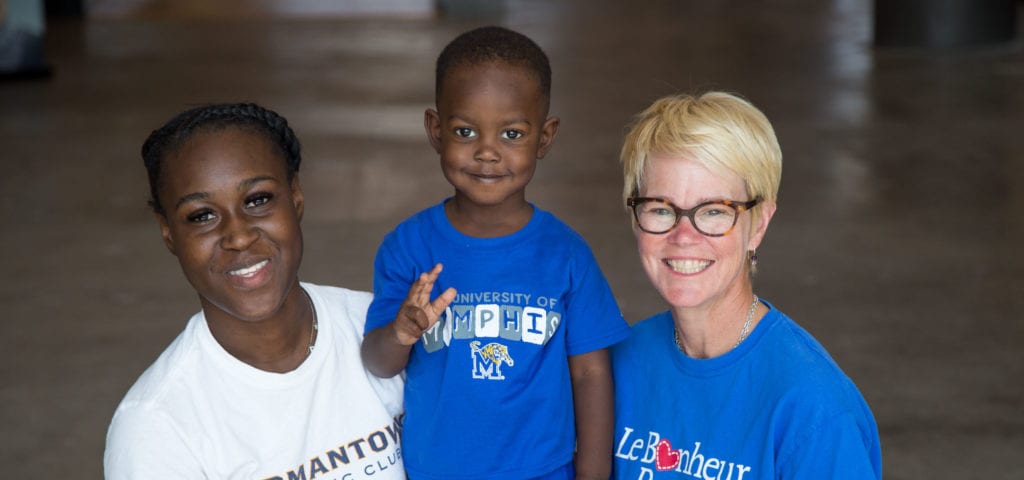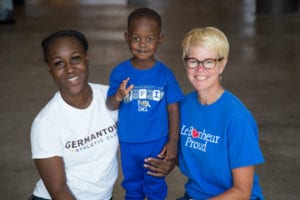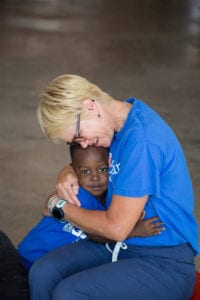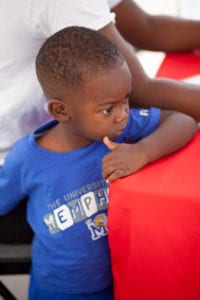
Nurse Beth was worried. She had been working with Shantriva for several months, and after a healthy pregnancy and the birth of her son, the young mother was not looking well.

Beth, a nurse with Nurse-Family Partnership® at Le Bonheur Children’s Hospital in Memphis, Tennessee, thought it was more than the fatigue that often accompanies the life of working parents of small children. Something was wrong.
“She was losing weight,” Beth said. At each visit, she noticed that Shantriva was thinner, more exhausted, more and more gaunt.
Shantriva sought medical help at a clinic and was told she was fine.
Beth wasn’t satisfied.
“At that point, she looked terrible,” Beth said. “She had no energy and was very fatigued. She also had a slight cough.”
Shantriva was working at a restaurant and was so tired and lightheaded, she sometimes would rest her head on the cash register between customers.
“Everybody thought I was pregnant or just lazy because I was sleeping a lot,” Shantriva said.
At Beth’s urging, Shantiva returned to the clinic.
When she described her symptoms and what was happening in her personal life, she fell apart. “I started crying,” Shantriva said. “I was a mess.”
The nurse practitioner diagnosed her with depression and suggested she seek counseling.
But days later when she told Beth what happened at the clinic, Beth was clearly concerned. Shantriva said she was going back, and this time Beth was going with her.
“She could barely stand up,” Beth said. “Her heart rate was through the roof. She had altered breath sounds. This wasn’t depression; she was sick.”
At the clinic, Beth introduced herself as Shantriva’s nurse home visitor, told her of her catalog of severe symptoms and said she needed a full health assessment. With Shantriva’s permission, Beth was able to advocate for the exam and potential treatment that should have been apparent.
Finally, the nurse practitioner approached Shantriva, performed a tuberculosis (TB) test and ordered a chest X-ray.
That night, Shantriva texted Beth a photo of the TB test site on her arm. It was clearly positive.
After all the delays in diagnosis, Beth acted quickly to save Shantriva’s life.
She went to Shantriva’s home and called an ambulance to take her to the hospital.
“When we got there, I was interrogated by the hospital social worker,” Beth said. “She said, ‘Why is she this sick? Why is she coming in this condition?’ ”
For Shantriva, the TB diagnosis was “the scariest moment of my life.”
Tuberculosis, most often found in the lungs, can affect the brain and other organs and can be fatal. It is transmitted through breathing the bacteria in the air.
While Shantriva was relieved to finally be getting treatment, a new fear was taking hold. She wouldn’t be able to be around Tony, then 13 months old, until she was well.
“It was so hurtful when they took my baby from me,” Shantriva said. “I was just praying, praying, praying.”
Shantriva was released from the hospital after a few days and was quarantined alone in a motel in Memphis.

But, Shantriva said, “I guess I was blessed, so to speak, because I had food, a phone, medicine and someplace to stay.
“But I couldn’t have my baby and that really hurt. I was afraid they were going to take my baby away forever.”
Tony was staying with his grandmother, and Shantriva tried to talk to him over the phone.
“He was so little. After a while I don’t think he remembered me a lot,” she said.
When the family would bring him to see her through the window of her motel room, “he would turn away when he saw me because he didn’t remember me. That hurt me so much.”
Beth left food, books, clothing and other items outside Shantriva’s motel room door throughout the time she was quarantined.
“She had lost so much weight, none of her clothes fit anymore,” Beth said.
She also called frequently and made regular visits to check on Tony’s development and his health. He had tested positive for TB but had no symptoms. He was treated for latent TB.
“She would report back to me after she visited him,” Shantriva said. “She’d tell me that he was OK.”
Finally, after three months in the motel, taking eight pills a day, reading, watching TV and exercising to restore her strength, Shantriva was cleared to return home to Tony.
It wasn’t easy to get an apartment after being out of work for so long, though.
“BETH WAS REALLY A BLESSING,” SHE SAID. “SHE FOUND A WAY.”
She worked with her organization with help from a local funder to pay an outstanding utility bill Shantriva had, found an apartment and helped locate bed sheets and other basics to make it a home.
“She helped me out tremendously,” Shantriva said. “Just being by my side was really valuable. Without her I wouldn’t have made it through those three months.
“She’s just a good person.”
Since she recovered, Shantriva has earned her GED and is working two jobs, one at a Lennys restaurant and another at Popeyes. She has told her story in a panel discussion on health disparities in Memphis and has met with state legislators to talk about ways to address the situation.
Black Americans frequently experience health disparities due to systemic racism. Nurse-Family Partnership nurses are helping clients advocate for better access and equity in health care.
With Beth’s support, Shantriva was able to get the treatment she needed that saved her life. Left untreated, TB can have life-threatening consequences.
The experience was frustrating for Beth, but far from unusual. “I have never lived inside a brown or black body, but nearly every single client I work with has. I see the systemic racism present in their lives daily.
“I saw first-hand the systemic racism in Shantriva’s experience with the healthcare system – and the impact that racism was having on an urgent health condition.”
At last, Shantriva is healthy and focused on the future.
“She’s a great human being,” said Beth. “She wants to give back, to help other people. She’s made fantastic strides.”

“I have so many dreams it might make you laugh,” she said.
“I want to be a mentor to women with low self-esteem. I want to own a shelter for the homeless. I want to have a YouTube channel and write a book. I want to be an entrepreneur. I want to be wealthy.”
For now, though, the 25-year-old who survived TB and all its impacts is happiest being Tony’s mom.
“He’s 4 going on 30,” she joked.
“He’s very smart and already uses a lot of big words. When he was younger, I read a lot of books to him. He started talking at around 10 months and soon talked in full sentences.”
As for herself, Shantriva said she feels stronger and more confident than ever.
“When I was in the motel, I was so skinny I’d cry when I looked in the mirror. Now I feel great. I’m healthy and happy, and I’m glad I went through something like that because I know what it feels like to come out of something so terrible.
“Most definitely I’m better able to advocate for myself and my family. I know a lot of people are struggling with the coronavirus going on. I tell people my story and that I don’t feel like I was heard. The nurse practitioner didn’t take me seriously. I know what that’s like.”
“I want to help women advocate for themselves. Then we’ll all be a lot stronger when this is behind us.”

